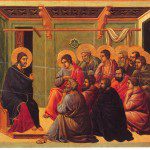Jacob, who was later renamed Israel, served in himself a representation of all the people of God. His life, his struggles, certainly were his own, but they also participate in and exemplify the difficulties that anyone who is to be found in the people of the true and eternal Israel will experience, in one form or another. As the Holy Spirit worked with human authors to put his stories down for us to remember him and his achievements, the Holy Spirit made sure there were clues to higher spirituality realities which we can receive from the lessons of his life. We do not have to engage him merely as a historical figure who lived and died in the past. He has become mythic, and in his myth, we find common elements to classical mythology, especially those associated with Hercules, being incorporated in the telling of his life. This does not make the story false, but rather, it shows how the truths we find in myths can be and should be taken on as we develop new stories and new myths, changing them to suit the person involved.
When we realize that we can do this with holy figures like Jacob, we can also do so with ourselves. We can take the truths found in such myths, explore the meaning of values of those truths, and creatively engage them for ourselves. We should discover what it means to say that our own life can be seen as a story being told. Instead of shying away from myth, we turn ourselves towards it, welcoming the transcendent graces which come from myth, cooperating with them so that we can bring them into our own lives, making us richer through them.
![Jacob wrestling by Eugène Delacroix [Public domain or Public domain], via Wikimedia Commons](https://wp-media.patheos.com/blogs/sites/637/2017/04/Eug%C3%A8ne_Ferdinand_Victor_Delacroix_061-205x300.jpg)
And Jacob was left alone; and a man wrestled with him until the breaking of the day. When the man saw that he did not prevail against Jacob, he touched the hollow of his thigh; and Jacob’s thigh was put out of joint as he wrestled with him. Then he said, “Let me go, for the day is breaking.” But Jacob said, “I will not let you go, unless you bless me.” And he said to him, “What is your name?” And he said, “Jacob.” Then he said, “Your name shall no more be called Jacob, but Israel, for you have striven with God and with men, and have prevailed. ” Then Jacob asked him, “Tell me, I pray, your name.” But he said, “Why is it that you ask my name?” And there he blessed him. So Jacob called the name of the place Peniel, saying, “For I have seen God face to face, and yet my life is preserved” (Gen. 32:24 – 30 RSV).
There are many ways Jacob could have said to have wrestled with God. Typically, it is said that he wrestled against all that is evil and unjust, against temptation, with the aid of God. Then, as St. Ambrose indicated, because of his victory, Jacob was rewarded by God with a prophetic indication of the coming of the messiah through his lineage:
Therefore Jacob, who had purified his heart of all pretense and was manifesting a peaceable disposition, first cast off all that was his, then remained behind alone and wrestled with God. For whoever forsakes worldly things comes nearer to the image and likeness of God. What is it to wrestle with God, other than to enter the struggle for virtue, to contend with one who is stronger and to become a better imitator of God than the others are? Because Jacob’s faith and devotion were unconquerable, the Lord revealed His hidden mysteries to him by touching the side of his thigh. For it was by descent from him that the Lord Jesus was born of a virgin, and Jesus would be neither unlike nor unequal to God.[1]
As God was to come down and assume human nature through the seed of Jacob, through the seed of historical Israel, so historical Israel found itself lifted up in its foundation in Jacob, making him a type of the messiah. Since Jesus is God who became man, while in Jacob we see represented what happens with the correct human response to the messiah, with the elevation of humanity to a deified form, goodmanhood, thanks to grace. This was what Peter was talking about when he explained the effects of Christ upon us. That is, Peter showed how grace is meant to elevate us, to make us better than what we would have been before the fall, transcending all that we might think possible as we become partakers of the divine nature:
His divine power has granted to us all things that pertain to life and godliness, through the knowledge of him who called us to his own glory and excellence, by which he has granted to us his precious and very great promises, that through these you may escape from the corruption that is in the world because of passion, and become partakers of the divine nature (2Ptr. 1:3-4 RSV).
Jacob, being the source and foundation of historical Israel, was given special grace to become a divinized man in pre-history, to be a “man-god,” who is fully man but who partakes of and is receives the strength of God to aid him in his life. Jacob as a strong-man was able to do extraordinary feats and labors, thanks to God’s blessing. He had been granted a vision of God, and through that vision, he was enlightened by God, made a conqueror over all, as St. John Chrysostom said as if talking to Jacob himself: “No longer have any fear nor expect to suffer any harm from anyone: having gained such might in the first place as to succeed in wrestling with God, much more will you prevail over human beings and prove superior to all.”[2]












